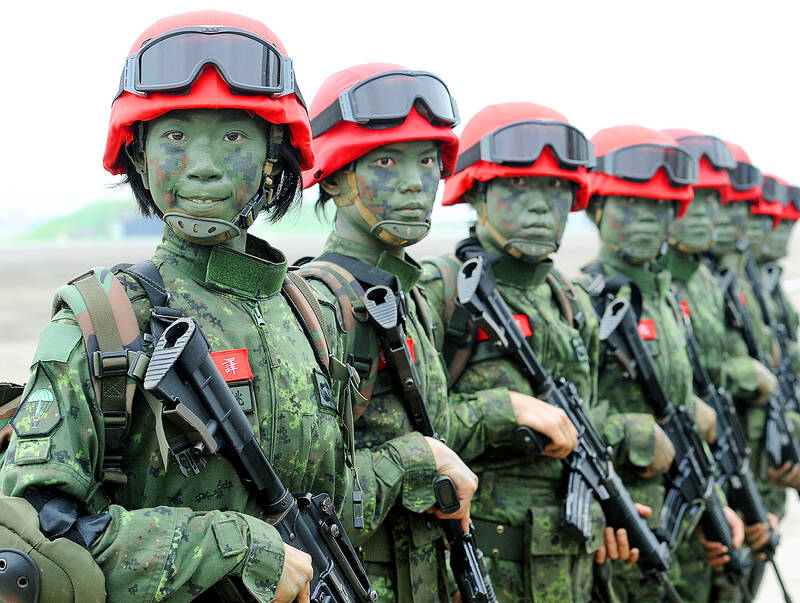Not requiring the nation’s female military reservists to attend training is not only a waste of resources, but runs contrary to gender equality, the Legislative Yuan’s Budget Center said in a report.
The government established the All-out Defense Mobilization Agency to improve the combat readiness of Taiwan’s reserve units, but has overlooked female reservists, said the report on the Ministry of National Defense’s financial statements for last year, which was released this month.
This year, the ministry began trialing a new model of educational mobilization under which military reservists must undergo two weeks of training and can be called up once a year.

Photo: Fang Pin-chao, Taipei Times
There are not enough army officers and non-commissioned officers in the reserve forces, so the military extended the period during which they can be called up from eight years to 12 years after being discharged from military service.
Female volunteers, as with their male counterparts, should according to the law be listed as reservists after being discharged from the army, the report said.
However, the current policy stipulates that female military officers and non-commissioned officers can choose not to be listed as reservists after being discharged, it said, adding that the practice contravenes the principle of equality.
Only a limited number of female officers had as of the end of last year volunteered to be listed: 487 army officers and 2,608 non-commissioned officers among 8,915 retired female military personnel, the report said.
Female military personnel receive professional training and gain practical experience during service, so should have more knowledge and skills than men who undergo mandatory military training, the report said, adding that not requiring them to attend educational mobilization makes the list “a mere formality.”
Chang Ling-ling (張玲玲), a colonel who was discharged last month and volunteered to be listed as a reservist, on Saturday said that she “had been nurtured by the armed forces during four years in military school and 30 years in the army,” so she was willing to contribute her experience and be listed.
Being mobilized in wartime without undergoing mobilization training “would be a great loss,” she said.
Regarding concerns about separating living spaces for female and male reservists, she said that it could be planned.
Military personnel are responsible, and women have been serving in the armed forces for years, she said.
Democratic Progressive Party Legislator Lin Ching-yi (林靜儀), a member of the legislature’s Foreign Affairs and National Defense Committee, on Saturday said that the ministry should consider including retired female officers in the educational mobilization program to bolster the nation’s reserve forces.
The ministry said it would assess the feasibility of including female reservists in the program based on the level of threat from enemies, the need for defensive operations and military training capacity.

The US government has signed defense cooperation agreements with Japan and the Philippines to boost the deterrence capabilities of countries in the first island chain, a report by the National Security Bureau (NSB) showed. The main countries on the first island chain include the two nations and Taiwan. The bureau is to present the report at a meeting of the legislature’s Foreign Affairs and National Defense Committee tomorrow. The US military has deployed Typhon missile systems to Japan’s Yamaguchi Prefecture and Zambales province in the Philippines during their joint military exercises. It has also installed NMESIS anti-ship systems in Japan’s Okinawa

‘WIN-WIN’: The Philippines, and central and eastern European countries are important potential drone cooperation partners, Minister of Foreign Affairs Lin Chia-lung said Minister of Foreign Affairs Lin Chia-lung (林佳龍) in an interview published yesterday confirmed that there are joint ventures between Taiwan and Poland in the drone industry. Lin made the remark in an exclusive interview with the Chinese-language Liberty Times (the Taipei Times’ sister paper). The government-backed Taiwan Excellence Drone International Business Opportunities Alliance and the Polish Chamber of Unmanned Systems on Wednesday last week signed a memorandum of understanding in Poland to develop a “non-China” supply chain for drones and work together on key technologies. Asked if Taiwan prioritized Poland among central and eastern European countries in drone collaboration, Lin

NO CONFIDENCE MOTION? The premier said that being toppled by the legislature for defending the Constitution would be a democratic badge of honor for him Premier Cho Jung-tai (卓榮泰) yesterday announced that the Cabinet would not countersign the amendments to the local revenue-sharing law passed by the Legislative Yuan last month. Cho said the decision not to countersign the amendments to the Act Governing the Allocation of Government Revenues and Expenditures (財政收支劃分法) was made in accordance with the Constitution. “The decision aims to safeguard our Constitution,” he said. The Constitution stipulates the president shall, in accordance with law, promulgate laws and issue mandates with the countersignature of the head of the Executive Yuan, or with the countersignatures of both the head of the Executive Yuan and ministers or

Renewed border fighting between Thailand and Cambodia showed no signs of abating yesterday, leaving hundreds of thousands of displaced people in both countries living in strained conditions as more flooded into temporary shelters. Reporters on the Thai side of the border heard sounds of outgoing, indirect fire yesterday. About 400,000 people have been evacuated from affected areas in Thailand and about 700 schools closed while fighting was ongoing in four border provinces, said Thai Rear Admiral Surasant Kongsiri, a spokesman for the military. Cambodia evacuated more than 127,000 villagers and closed hundreds of schools, the Thai Ministry of Defense said. Thailand’s military announced that